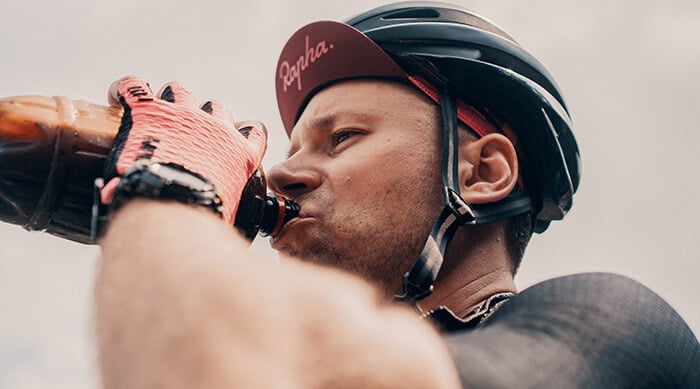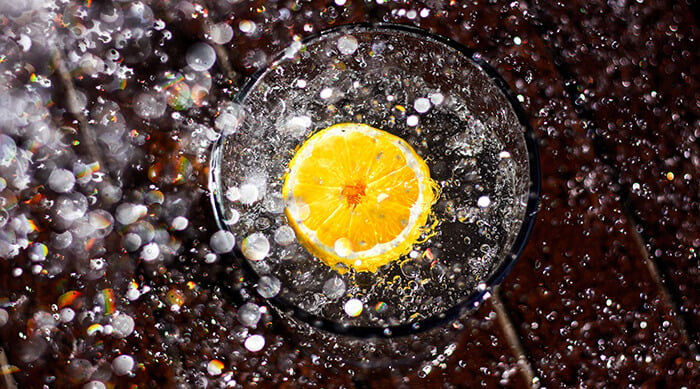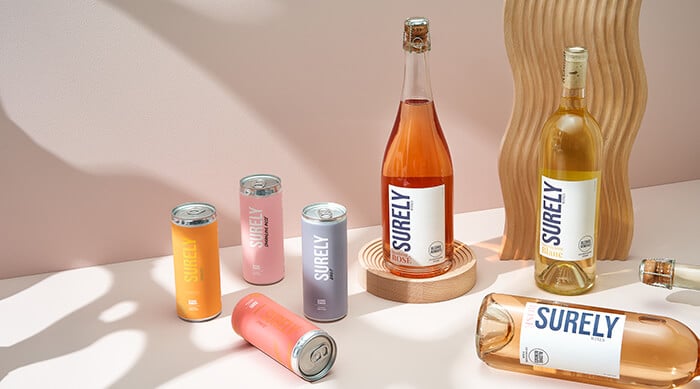Functional beverages promise all kinds of things, from stress relief to a healthy dose of key vitamins and minerals. They may even be high in ingredients you’ve never heard of, but they sound like they just might be good for you.
It’s hard to find a sip of something that doesn’t include wellness effects on its label, but what’s really in these drinks? Do these ready-to-drink beverages promise too much, or do they actually work?
What is a functional beverage?
Functional foods and beverages are used to promote various health benefits.
Health beverages have been around for a long time, but the trend lately is for more and more drinks out there to include some kind of purported health benefit.
What is the difference between functional beverages and food? The difference between functional beverages and food is that functional beverages come in liquid form.
This generally non-alcoholic beverage category typically includes added ingredients that promote overall well-being. These added ingredients may not always occur naturally in that food or drink.
The Most Common 15 Functional Beverages
Functional beverages are everywhere, but they’ve also been everywhere. Most of you will start your morning with one, and reach for another at some point before the day’s out.
Some are better than others, but they all have one thing in common: They boast health benefits, often added with existing ingredients in what you’re drinking.
Coffee
You may not consider coffee a functional beverage, but fans will disagree, calling coffee a predecessor to all of these functional drinks.
After all, coffee does contain antioxidants that promise a reduced risk of many chronic conditions.
All of that links back to caffeine, a nootropic that many drinks have tried to replicate in functional drinks with ginseng and the amino acid L-theanine, supplements linked to attentiveness.
Tea
As with coffee, tea is one of the original functional beverages. Green tea, in particular, is lauded for its health benefits, including reduced inflammation.
Some brands in the functional beverage industry actually use extracts found in green tea to boost the health benefits of non-tea drinks. You’ll often see it in sparkling drinks and CBD-infused beverages.
Fortified Juices
Some vegetable and fruit juices are functional juices. They contain added nutrients that may not necessarily appear in the oranges, pineapples, or veggie blends you’re sipping.
For instance, many jugs of orange juice add in calcium as a way to provide a little something extra on top of the high amount of vitamin C.
Wine
While functional beverages rarely contain alcohol, the health benefits of wine, particularly red wine, are too significant to ignore in this category.
Drinking red wine in moderation is associated with positive trends in heart health, diabetes risk, neurological health, weight gain, and even certain cancers.
Functional wines are low in sugar and chemicals that make cheap wines so bad for health. Alcohol-removed wines are an even newer trend in the beverage industry, taking advantage of the popular sober curious movement of wine lovers who want to drink less alcohol.
Coconut Water
Coconut water is the most popular plant-based water and has been around long before “smart” drinks that include similar properties. The beverage gives the body a dose of potassium and natural electrolytes, and it’s widely considered an excellent choice to rehydrate after exercise.
Prebiotic/Probiotic Drinks
Kombucha, enhanced waters, and other fermented beverages will often include prebiotics or probiotics to promote gut health and solid digestive health.
Some studies out there support this and consider these drinks safe, with the caution that more research is needed to truly link gut health with these functional beverages.
Protein/Nutritional Shakes
Protein and other nutritional shakes are no longer only meal replacements used as a weight management strategy.
Brands like Boost promote their shakes to supplement diets lacking in essential vitamins and minerals like magnesium, calcium, and vitamin B. They market themselves as an easy way to get the nutrients you need on the go.
Energy Drinks
Functional energy drinks are typically used as an added caffeine source. Some will claim additional functional ingredients like vitamins and minerals on top of the energy boost.
It’s important to read labels carefully, as some of the most well-known energy drinks are full of sugar and artificial preservatives that negate any energy benefit.
Seltzers like Bai Bubbles Sparkling Water are better, as they include caffeine without all the sugar.
Sports Drinks
We’ve all seen commercials for popular electrolyte-replenishing drinks out there, from Gatorade to Powerade to generic brands marketed as an aid in workout recovery.
These drinks promise to return your body to equilibrium, replacing what you lost after a good sweat. Most often, that’s electrolytes (sodium, potassium, magnesium, and calcium).
Studies caution athletes, particularly young athletes, around reading labels for sports drinks carefully.
There is no one ingredient list across the board for electrolyte-infused sports drinks, and some may include additives that you may react to (often, simply there for color and taste).
Enhanced Waters
Water should be what you’re reaching for most often when you’re feeling parched.
The global functional beverage market knows this, so they’ve come up with punched-up versions of water: enhanced waters promising hydration and a side of additional vitamins and minerals.
Vitamin Water is a common brand in the world of enhanced waters.
Alkaline water, which often includes added nutrients to bring its pH levels over 7, promises super hydration and a detoxifying effect in the bloodstream.
Some studies support the idea that alkaline water hydrates the body more efficiently, but there isn’t enough research to say it’s better than plain water otherwise.
Functional Sodas
Functional sodas aren’t the sugar bombs of yesterday. Soda producers know consumers are looking for new products to replace sodas they’ve learned aren’t very good for them.
These new sodas promise gut health, calming effects, and a chance at banishing fatigue. Brands like OLIPOP include prebiotics and plant fibers, without any added artificial sweeteners.
The makers of big-name soft drinks like PepsiCo have also been getting in on the functional beverage game. Their Soulboost beverage claims to both calm and improve mental stamina.
Botanicals
Botanical beverages and botanicals incorporated into popular drinks have gained traction as a healthy, even premium alternative to legacy go-to beverages.
These are plants and herbs that come with claims of immune system boosts. Extracts of juniper, hibiscus, and the natural herb turmeric have all been popping up in sparkling waters and other beverages boasting natural ingredients.
Already common in alcoholic drinks as a way to add herbal notes to a cocktail, the purported health benefits of these plant-based ingredients vary.
Generally, the amount of each botanical in functional beverages is minimal, though, likely doing more for your palate than your health.
CBD-Infused Beverages
CBD-infused beverages promise the mellow-out effect and have only grown in popularity among stressed-out people during the pandemic.
The brand Recess has embraced not only the hemp effect, but adaptogens, too. These are essentially herbs or mushrooms that promise all-natural functional benefits for an ailment.
Their cans are marketed to elicit “calm,” using CBD and ingredients like ginseng, lemon balm, and L-theanine with which to do so.
THC-Infused Beverages
Much like CBD-infused beverages, THC-infused drinks like those from brand Cann promise a controlled, relaxed experience with their low doses of THC.
They’re popular in states like California with growing legal recreational cannabis markets, billing themselves as alternatives to edibles or vapes that may not yet be as socially acceptable.
You may even start seeing the drinks in breweries, as some beermakers are looking to THC and CBD to supplement their traditional beer offerings.
Collagen Drinks
Collagen supplements promote healthier complexions, firmer skin, and an anti-aging effect. It’s not surprising, then, that these supplements now come in drink form with similar claims of bright, luminous skin after regular consumption.
Some collagen supplements also benefit joint health and other effects of declining collagen production over time.
While ingesting collagen has shown some promise in topping your body up with this naturally-occurring anti-aging protein, the problem is the amount you’d need to take in daily.
To really see the positive effects of collagen on skin elasticity and to get that luminous glow you’re promised, you’d need to consume collagen drinks on a daily basis.
The effects may be positive but temporary, and don’t replace healthy skin habits like wearing sunscreen regularly.
Industry Trends & Market Share
Functional beverages continue to see rapid growth with growing potential for an increased market share. Consumers are willing to pay a little extra to gain more than hydration from their beverages.
According to a Yahoo! Report:
“The Global Functional Beverage Market size was estimated at USD 108.88 billion in 2020, is expected to reach USD 120.28 billion in 2021, and projected to grow at a CAGR of 10.49% reaching USD 198.12 billion by 2026.”
Innova Marketing Insights reported in their 2017 “Functional Drinks” report that in 2016, functional beverages accounted for over 27% of newly launched drink brands. This equates to a compound annual growth rate (CAGR) of 12.6% over just 4 years (2012-2016).
One study showed that those drinks still have to be delicious to sell, though. Additives that aren’t too pleasing to the taste buds aren’t going to sell as well as tasty, fruity concoctions that promise a side of antioxidants.
The big push for hybrid drinks will continue, particularly as consumers seek daily immunity-boosting functional foods and beverages. These drinks promise hydration on top of some additional focused beverage innovation, like your daily dose of amino acids or weight loss.
Do functional beverages actually work?
Some functional beverages are genuinely healthy and live up to the hype. The “original” functional beverages, like coffee and tea, have proven health benefits when consumed in moderation.
In most healthy adults, functional beverages that include added vitamins, minerals, and immune-boosting ingredients can add a little something extra to an already healthy diet.
It’s essential, though, to read labels carefully to know exactly what you’re drinking, and to research any bold health claims with a healthy dose of skepticism.
Are functional drinks safe? Functional drinks can be safe, but some can come with health concerns.
Energy drinks shouldn’t be consumed in large quantities by children, teens, or young adults. It’s easy to consume too much caffeine in that form, leading to caffeine withdrawal symptoms and adverse heart reactions.
Some functional beverages also sneak in added sugar, which significantly impacts their potential for health benefits. Sugary, high-calorie beverages can not only lead to weight gain and bust your diet, but they can also be detrimental to long-term health in almost every way.
A great rule of thumb: It’s important to note that if it sounds too good to be true, it very well may be.
Function CAN Be Delicious
Functional beverages are non-alcoholic, but that doesn’t mean you can’t enjoy the positive health benefits of wine, like antioxidant-boosting resveratrol, if you’re seeking non-alcoholic drinks.
We know you have choices when it comes to not only functional beverages, but everything you drink.
Surely’s all about variety, while giving you something delicious and low-calorie.
It’s why our alcohol-removed wines have a little something for everyone, from our classic non-alcoholic white wine to our new spritzes. Try our new Lemon Ginger Spritz or Coconut Passion Fruit Spritz. Both come canned for easy portability.
Sources
- Is coffee a functional food?
- Acute effects of tea constituents L-theanine, caffeine, and epigallocatechin gallate on cognitive function and mood: a systematic review and meta-analysis
- Health Benefits and Chemical Composition of Matcha Green Tea: A Review
- Wine and Health-New Evidence
- Rehydration after exercise with fresh young coconut water, carbohydrate-electrolyte beverage and plain water
- Microbial Ecology of Fermented Vegetables and Non-Alcoholic Drinks and Current Knowledge on Their Impact on Human Health
- Role of Functional Beverages on Sport Performance and Recovery
- The Effects of High Mineral Alkaline Water Consumed Over Three Consecutive Days on Reaction Time Following Anaerobic Exercise - A Randomized Placebo-Controlled Crossover Pilot Study
- A Collagen Supplement Improves Skin Hydration, Elasticity, Roughness, and Density: Results of a Randomized, Placebo-Controlled, Blind Study
- The Development and Consumer Acceptance of Functional Fruit-Herbal Beverages
- Energy Drinks and Their Impact on the Cardiovascular System: Potential Mechanisms





![Healthy Drink Brands to Try Today [Tea, Soda Swaps & More]](https://dropinblog.net/34240221/files/featured/Healthy_Drink_Brands.jpg)
